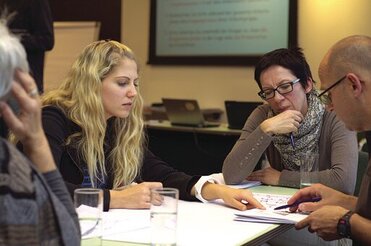 Leaders consistently rate their own meetings much more positively than attendees do. When managers assume their meetings are going smoothly, they are less likely to solicit feedback and seek opportunities to improve. As a result, frustrations that attendees experience don’t get fixed (irrelevant agenda items, unnecessarily long duration, lack of focus), leaving employees disgruntled and disengaged. Writing in the Harvard Business Review, Steven G. Rogelberg, Chancellor’s Professor at the University of North Carolina Charlotte and author of The Surprising Science of Meetings, helps managers improve their meeting skills. Among his tips:
What have you done to improve the caliber of team meetings? To join the conversation, click "comments" above. If you would like to learn more about creating a habit around masterful communication, visit our online learning programs.
0 Comments
 In a commencement address at Stanford, Google CEO Sundar Pichai spoke four words that encapsulate years of research on the psychology of human motivation: "Reward effort, not outcome.” Pichai is tapping into the power of creating sources of intrinsic motivation: People are moved to do something because they enjoy it, love the challenge, or find it intriguing…not to gain a reward or avoid punishment. This strategy he says, works well not just with your employees but also with your kids. Although it might seem counterintuitive, science backs up this approach. Here’s why:
When was the last time someone celebrated your effort regardless of outcome, and how did you respond? To join the conversation, click "comments" above. We would love to about your experience!  As any manager who has tried it can tell you, onboarding new employees remotely is a challenge. And a bad onboarding experience can have long-lasting negative fallout. Writing in the Harvard Business Review, James M. Citrin and Darleen DeRosa, co-authors of Leading From a Distance: Practical Lessons for Virtual Success, offer recommendations for companies large and small who want to make onboarding strategies succeed.
|
Archives
July 2024
Categories
All
|
|
Glaser & Associates, Inc.
Executive Offices 1740 Craigmont Avenue, Eugene, OR 97405 541-343-7575 | 800-980-0321 [email protected] |
© 2019 Glaser & Associates. All Rights Reserved.


 RSS Feed
RSS Feed